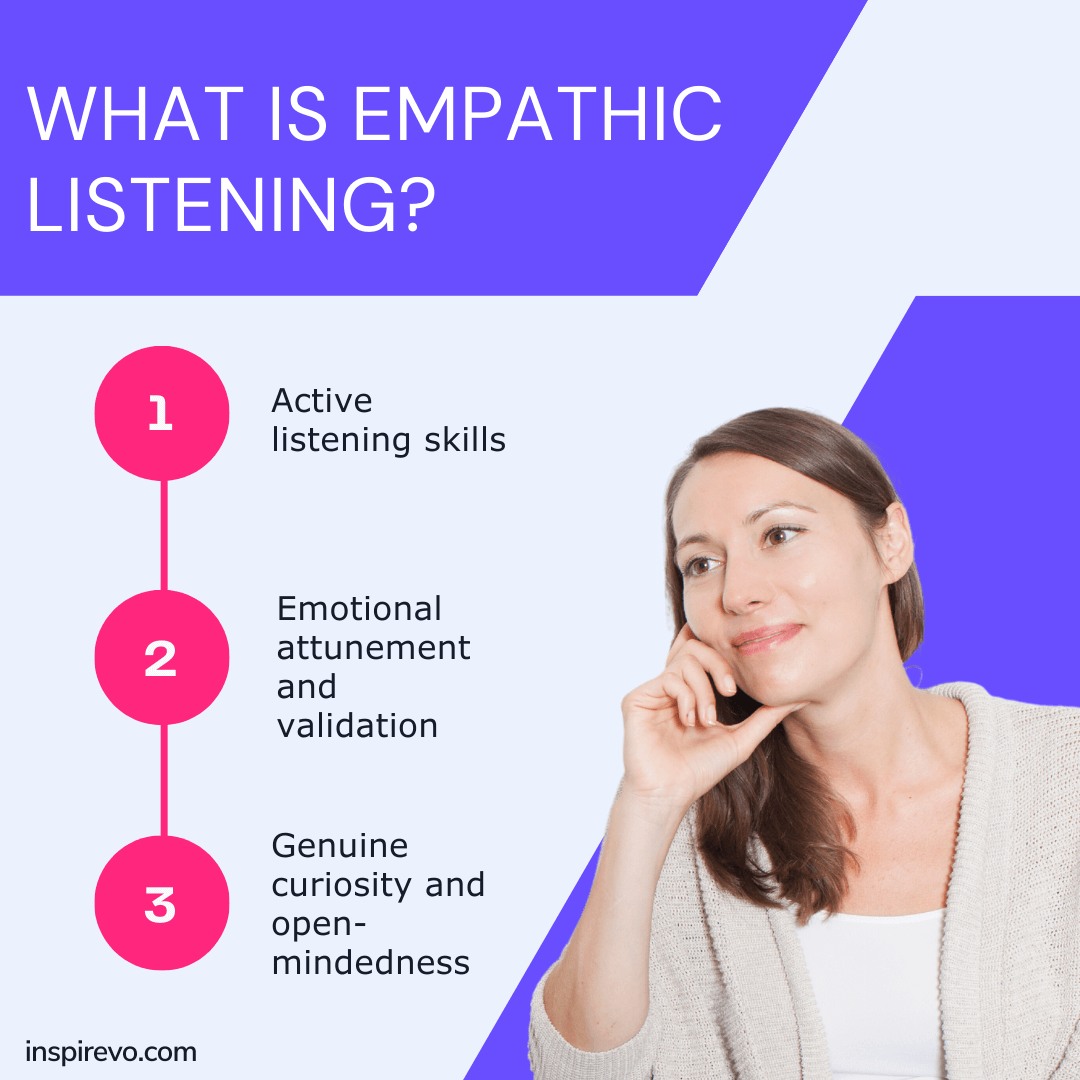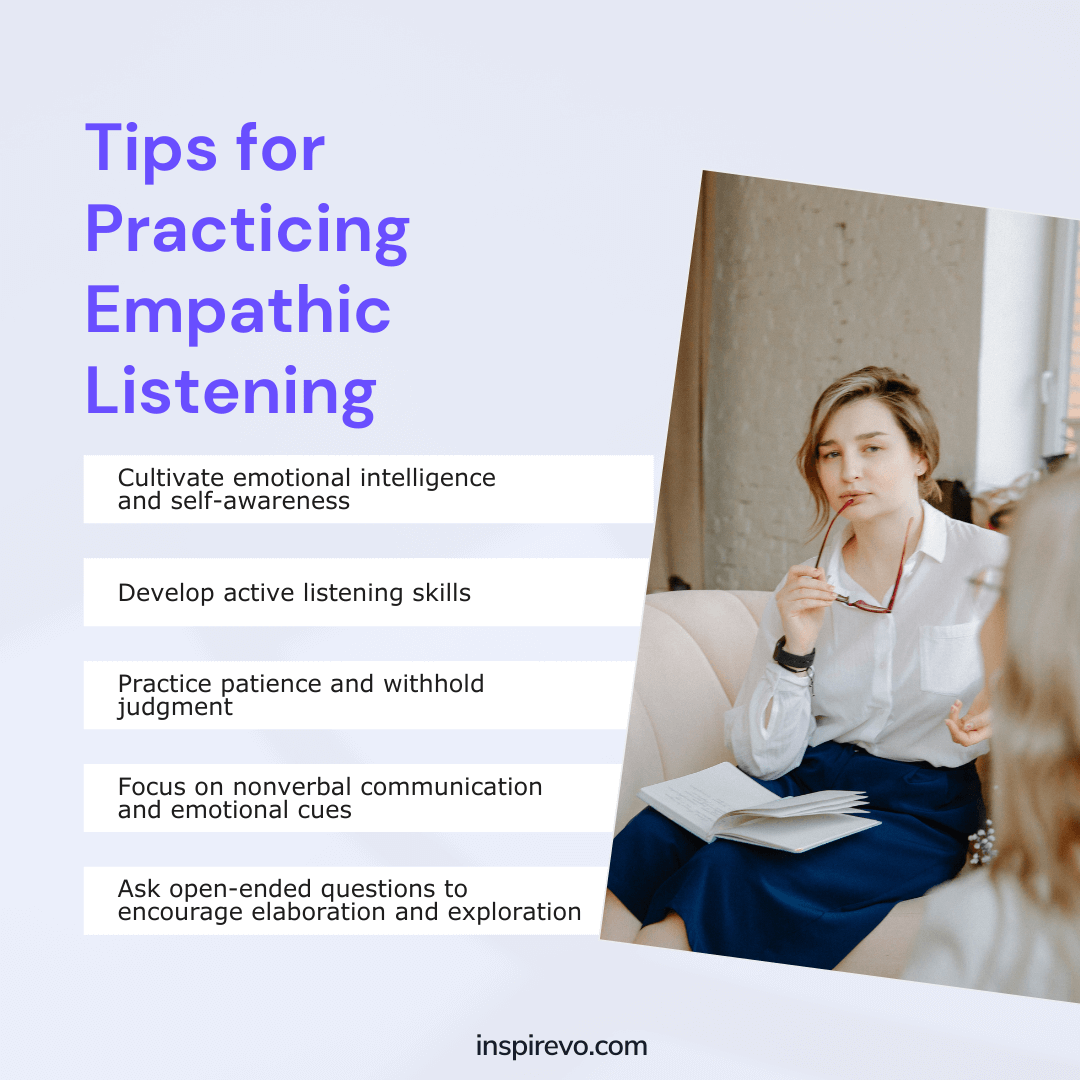
Write your awesome label here.
Empathic Listening: The Power of Understanding and Connection
Empathy is a crucial element of effective communication, helping to build relationships and foster connection. One way to practice empathy is through empathic listening, a powerful tool that can transform personal and professional interactions. This article delves into the concept of empathic listening, its benefits, applications in different contexts, and tips for developing this essential skill.
What is Empathic Listening?

Empathic listening is a deep form of active listening that involves not only hearing the words spoken but also understanding and connecting with the speaker's emotions, experiences, and perspectives. It requires genuine curiosity, open-mindedness, and a non-judgmental attitude.
Empty space, drag to resize
Unlike other listening styles that may focus on problem-solving, advice-giving, or simply waiting for a turn to speak, empathic listening aims to create an environment where the speaker feels heard, validated, and emotionally supported. Key components of empathic listening include:
Empty space, drag to resize
1. Active listening skills: Paying full attention, providing verbal and non-verbal feedback, reflecting and paraphrasing, and asking open-ended questions.
Empty space, drag to resize
2. Emotional attunement and validation: Recognizing and acknowledging the emotions expressed by the speaker, validating their feelings, and offering support.
3. Genuine curiosity and open-mindedness: Demonstrating interest in the speaker's thoughts and experiences, seeking to understand their perspective without imposing personal biases or judgments.
Empty space, drag to resize
The Benefits of Empathic Listening
Empathic listening offers numerous benefits that can enhance various aspects of life, including:
A. Enhanced interpersonal relationships:
1. Building trust and rapport: Empathic listening fosters an atmosphere of trust, allowing individuals to feel comfortable sharing their thoughts and emotions. For example, a friend who listens empathically can help someone feel more at ease discussing a difficult situation, knowing they will not be judged or dismissed.
Empty space, drag to resize
2. Deepening connections with others: By understanding and validating others' experiences, empathic listening strengthens emotional bonds. A couple who practices empathic listening can develop a deeper connection, as both partners feel heard and valued.
Empty space, drag to resize
3. Resolving conflicts and misunderstandings: Empathic listening can help clarify misunderstandings and facilitate constructive dialogue during conflicts. For instance, family members in a disagreement can reach a resolution more effectively when they practice empathic listening, as it allows them to understand each other's perspectives and emotions.
Empty space, drag to resize
B. Personal growth and self-awareness:
1. Developing emotional intelligence: Empathic listening promotes emotional intelligence by cultivating self-awareness, empathy, and compassion. As a result, individuals can better navigate their emotions and understand the emotions of others.
Empty space, drag to resize
2. Cultivating compassion and empathy: By focusing on understanding and connecting with others' experiences, empathic listening fosters empathy and compassion, essential traits for personal growth and emotional well-being.
Empty space, drag to resize
3. Expanding perspectives and understanding: Empathic listening encourages open-mindedness, broadening one's understanding of different experiences, cultures, and backgrounds.
Empty space, drag to resize
C. Improved professional outcomes:
1. Strengthening teamwork and collaboration: Empathic listening in a work setting can improve communication, collaboration, and team dynamics, leading to increased productivity and satisfaction. For example, a project manager who practices empathic listening can better understand team members' concerns and address them effectively.
Empty space, drag to resize
2. Enhancing leadership and management skills: Leaders who demonstrate empathic listening create supportive work environments and foster trust and loyalty among employees, resulting in higher morale and reduced turnover.
Empty space, drag to resize
3. Fostering a supportive work environment: An empathic listener in the workplace can help colleagues feel heard and valued, contributing to a positive and inclusive atmosphere.
Empty space, drag to resize
Empathic Listening in Different Contexts
Empathic listening can be beneficial in various contexts, including personal relationships, professional settings, and educational and therapeutic environments:
A. Personal relationships:
1. Enhancing intimacy and emotional connection: Couples who practice empathic listening can improve their communication, understand each other's needs, and develop a stronger emotional bond. For example, someone who listens empathically to their partner's concerns can better understand their feelings and offer appropriate support.
Empty space, drag to resize
2. Supporting loved ones through challenging times: Empathic listening can help friends and family members provide emotional support during difficult situations, creating a safe space for sharing and healing. For instance, a parent who listens empathically to their child's struggles at school can better understand their emotions and offer guidance.
Empty space, drag to resize
3. Nurturing healthy communication habits: By practicing empathic listening, individuals can foster healthy communication habits in their relationships, leading to increased trust, understanding, and connection.
Empty space, drag to resize
B. Professional settings:
1. Demonstrating empathy and understanding in the workplace: Empathic listening helps colleagues feel respected and valued, leading to improved workplace relationships and increased job satisfaction. For example, a manager who listens empathically to an employee's concerns can address issues more effectively and build trust.
Empty space, drag to resize
2. Utilizing empathic listening to improve teamwork and employee satisfaction: Teams that practice empathic listening can collaborate more efficiently, navigate conflicts, and foster a positive work environment. For instance, coworkers who listen empathically can better understand each other's perspectives, leading to more effective problem-solving.
Empty space, drag to resize
3. Effectively managing conflicts and difficult conversations: Empathic listening can facilitate constructive dialogue and resolution in challenging workplace situations, promoting a more harmonious work environment.
Empty space, drag to resize
C. Educational and therapeutic environments:
1. Promoting student engagement and well-being: Teachers who practice empathic listening can better understand their students' needs and emotions, leading to improved academic performance and overall well-being. For example, a teacher who listens empathically to a student's concerns about a project can offer appropriate support and guidance.
Empty space, drag to resize
2. Building trust and rapport with clients in a therapeutic setting: Therapists who practice empathic listening can establish a strong therapeutic alliance, helping clients feel heard, understood, and supported in their healing journey.
Empty space, drag to resize
3. Encouraging open communication and self-expression: Empathic listening in educational and therapeutic settings fosters a safe space for individuals to express themselves openly, promoting self-discovery and growth.
Empty space, drag to resize
Tips for Practicing Empathic Listening

To develop empathic listening skills, consider the following tips:
Empty space, drag to resize
Cultivate emotional intelligence and self-awareness: Develop an understanding of your emotions and reactions to enhance empathy and compassion.
Empty space, drag to resize
Develop active listening skills: Practice giving full attention, providing verbal and non-verbal feedback, reflecting and paraphrasing, and asking open-ended questions.
Empty space, drag to resize
Practice patience and withhold judgment: Approach conversations with an open mind and allow the speaker to express themselves without interrupting or jumping to conclusions.
Empty space, drag to resize
Focus on nonverbal communication and emotional cues: Pay attention to body language, facial expressions, and tone of voice to better understand the speaker's emotions.
Empty space, drag to resize
Ask open-ended questions to encourage elaboration and exploration: Use questions that promote deeper discussion and demonstrate genuine curiosity and interest in the speaker's experiences.
Conclusion
Empathic listening has the power to transform relationships, promote personal growth, and improve professional outcomes. By practicing and refining empathic listening skills, individuals can experience deeper connections, greater understanding, and a more fulfilling life. Embrace the power of empathic listening and witness its positive impact on your life.

